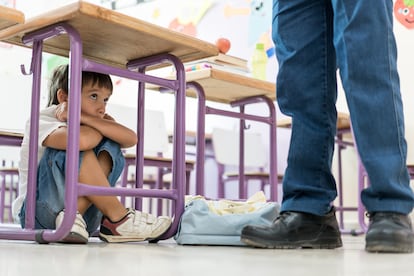Children sophophobia: What is it, and why does it occur?
The irrational fear of learning can be triggered by a traumatic experience at school. Factors such as excessive competition and low motivation influence the development of this fear, which can be addressed with positive reinforcement


Thanks to the Information Age, infinite channels and platforms exist to sate our thirst for knowledge. Now, a phobia that is completely antagonistic to the desire to learn has appeared: sophophobia. What is it, and why does it occur? Classified as a rare or specific phobia, included within the general phobias in the Diagnostic and Statistical Manual of Mental Disorders — a guide of the American Psychiatric Association widely used for the diagnosis of adults and children —, it is the fear of learning or acquiring new knowledge.
“If a child or adolescent begins to develop a fear of learning or a fear of going to different learning environments such as school, we could also call it school phobia,” says psychologist and educational psychologist Rosa Cohen. In these cases, she continues, it is usually necessary to analyze the minor’s insertion in the school and family environment to discover what situations cause them to panic: “For example, if he has suffered some type of bullying.”
Cohen explains that the fear and anxiety that a child with sophophobia may experience are normal emotions during their growth and development. “However, in some cases fear can cause significant distress and, even if not addressed correctly, some kind of functional impairment.”
A study published in 2022 in the scientific journal Neuropsycopharmacology Reports, entitled Perospirone augmentation of escitalopram in the treatment of an adolescent sophophobia (fear of learning) patient, mentioned that this irrational fear usually occurs as a product of a direct traumatic experience with some learning mechanism. Research indicates that prolonged demotivation over time can also lead to anxiety, panic and the refusal to acquire new knowledge. But there are other causes: “from simple irrational thoughts (so called because it is not demonstrable that what is thought will happen), such as ‘I will not be able to do it,’ ‘I will never learn,’ ‘I will not get over this’, ‘I will make a fool of myself,’ even an experience that could have been traumatic for the child or adolescent,” explains Patricia Sánchez, co-director of the Center for Advanced Psychological Treatment (TAP), a specialized team of health psychologists, psychiatrists, neuropediatricians and educational psychologists in Madrid.
“If we delve into the possible traumatic experiences for a minor, we can give examples such as having suffered bullying at school, or having received painful comments during an event related to a learning process, such as playing an instrument or sport,” continues Sánchez. “Or that the minor has heard comments from their father or mother that devalues their ability to acquire knowledge: ‘You are useless, you will never learn.’” In addition, as this expert explains, the context of the traumatic experience may not be academic, but could also come from family or social situations. “It may happen that children have been able to acquire some type of vicarious learning where another person — usually a reference figure for them — has undergone some difficult experience related to the learning process, like witnessing the ridicule that a friend received at school, or if his father has been criticized for wanting to learn to swim late in his life,” Sánchez explains.
Extreme competition and demotivation
Competition can also block a child’s abilities, such as thinking, “I’m not going to be able to do it; they’ll laugh at me.” “Thus the child refuses to learn something new, even experiencing their fear with symptoms such as pressure in the chest, tremors, sweating and tachycardia,” continues Sánchez. “The approach to the phobia is to assess what real evidence they have that they are not going to achieve their goal, and what is causing their thinking.”
On the other hand, as Rosa Cohen points out, we must understand demotivation as an emotional state that can have different causes: “A school environment that only promotes competition instead of cooperation, or that imparts an education based on rote learning, is meaningless when access to information today is unlimited.” “High demand on academic performance in the family may also trigger chronic demotivation,” adds Cohen. At the opposite extreme, demotivation can come from “solving everything for children and adolescents with the illusion of having everything under control and thus responding quickly to the demands of the environment,” she adds.
Cohen maintains that one of the essential guidelines for addressing these types of problems at the root, or as soon as possible, is positive reinforcement, however small the action may be, of the child’s learning process: “If he suffers for not wanting to go to basketball, the day he wants to go, even if in the end he decides to stay in the stands because he doesn’t feel able to participate in training, we should recognize and reinforce that effort.” In this sense, Sánchez recommends expressions such as: “you did well, you are closer to achieving it,” “we are going to go at the pace you need” or “I am proud of you for having been so brave to come today to see your teammates play.” For Sánchez, what is interesting is for the minor to decrease, and even eliminate, their phobia, beyond the results they achieve. “Sometimes, without intending to, we focus on results as a source of success, and we do not value effort, an aspect that is fundamental for this phobia and for any learning in life.”
Sign up for our weekly newsletter to get more English-language news coverage from EL PAÍS USA Edition
Tu suscripción se está usando en otro dispositivo
¿Quieres añadir otro usuario a tu suscripción?
Si continúas leyendo en este dispositivo, no se podrá leer en el otro.
FlechaTu suscripción se está usando en otro dispositivo y solo puedes acceder a EL PAÍS desde un dispositivo a la vez.
Si quieres compartir tu cuenta, cambia tu suscripción a la modalidad Premium, así podrás añadir otro usuario. Cada uno accederá con su propia cuenta de email, lo que os permitirá personalizar vuestra experiencia en EL PAÍS.
¿Tienes una suscripción de empresa? Accede aquí para contratar más cuentas.
En el caso de no saber quién está usando tu cuenta, te recomendamos cambiar tu contraseña aquí.
Si decides continuar compartiendo tu cuenta, este mensaje se mostrará en tu dispositivo y en el de la otra persona que está usando tu cuenta de forma indefinida, afectando a tu experiencia de lectura. Puedes consultar aquí los términos y condiciones de la suscripción digital.








































